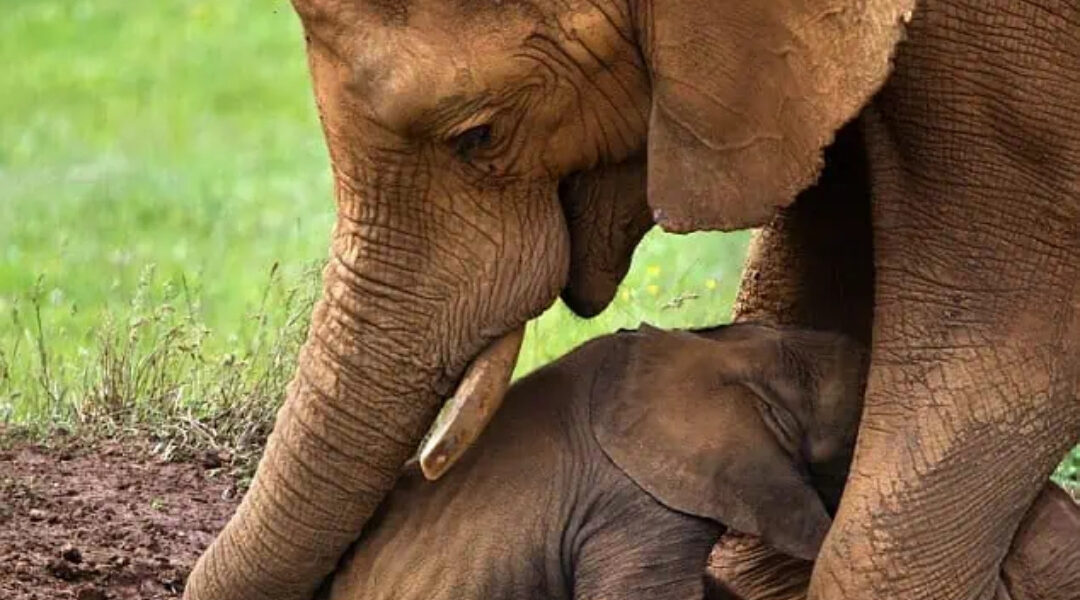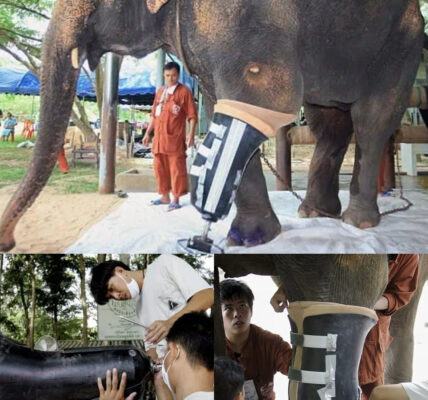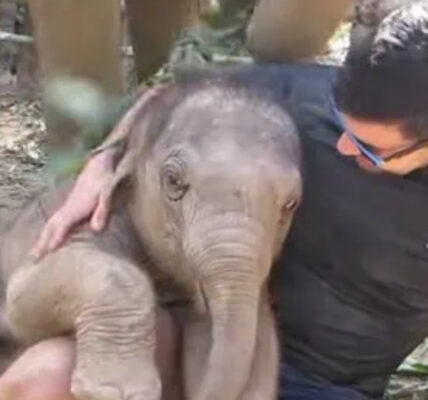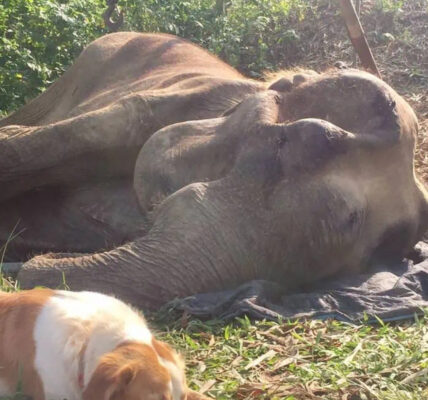The Rescue at the Watering Hole — A Mother’s Love as Powerful as an Elephant’s Strength.
The afternoon sun hung low over Cabárceno Wildlife Park, casting long shadows across the rolling landscape where one of Europe’s largest African elephant herds roamed freely. It was the kind of warm, golden day when everything seemed calm — mothers grazing lazily, young elephants splashing in shallow mud, older calves tumbling around like oversized children who didn’t yet know their strength.

But peace in the wild can change in a single heartbeat.
And on this particular day, it did.
A one-month-old calf — small, clumsy, and endlessly curious — had wandered toward a watering hole. To him, the world was still new. Every sound, every smell, every slippery patch of mud was an adventure waiting to be explored. He followed his mother and a slightly older cousin down the bank, unaware that danger can hide in places that look harmless.
As the mother and the five-month-old climbed easily up the opposite side, the younger calf followed, placing his feet exactly where he thought they had stepped.
But the mud shifted.
The ground sank.
And suddenly, the little elephant found himself sliding.
First one leg.
Then the other.
Then his belly.

Within moments, he was stuck — trapped knee-deep in cold, sucking mud.
His tiny trunk reached out in confusion, his soft rumbles rising into frightened squeaks. Instinct told him to follow his family, but the mud held him tight, pulling harder each time he tried to climb.
Up ahead, his mother froze.
Every elephant keeper in the world will tell you: the bond between a mother elephant and her calf is unbreakable. It is woven through instinct, memory, and a love so fierce that it rivals any human parent’s devotion.
And in that moment, the mother felt it like fire.
Her head lifted.
Her ears flared wide.
She turned around with the urgency of someone who had just heard a baby cry in the dark.
In seconds, she was running.

Visitors watching from the edges of the park fell silent. Even the other elephants paused, sensing her fear. The little calf cried louder, sinking deeper as the mud closed around his legs.
But his mother was already there.
She lowered her massive body until her eyes were level with his. She reached her trunk toward him — soft, steady, reassuring — letting him feel her presence before she even tried to lift him. Because for elephants, comfort comes before correction. Love comes before rescue.
Then, with a certainty that only a mother can possess, she wrapped her trunk around his tiny body.
First she tried pulling from the front.
The mud held tight.
Then she shifted, gripping around his middle.
Still no movement.
Finally, she reached for the one spot that would give her leverage:
His little tail.
Gently but firmly, she lifted.
For a moment, the calf’s back legs dangled as his front feet scrambled for solid ground. Mud clung to his skin, slipping, resisting — but a mother’s determination is stronger than any mud.
With one final tug, he popped free.

The crowd gasped in relief.
Some clapped.
Some cried.
Photographer Marina Cano, who lived near the park, captured the entire moment. She later said it felt like watching a human mother rescue her child — the urgency, the tenderness, the instinct to protect at any cost.
As the calf stumbled onto solid ground, he pressed himself into his mother’s legs, trembling. She lowered her head and stroked him gently with her trunk, checking for injuries, soothing him, reminding him he was safe. The older cousin trotted back and circled around them nervously, as if offering help despite not fully understanding what had happened.
The mother elephant stood guard, forming a living shield with her body — her posture saying what words never could:
“You’re safe now.
Nothing will hurt you.
Not while I’m here.”
Around them, other elephants began to move closer. Elephants don’t ignore distress. They don’t abandon their young. In the wild, if a calf cries, the whole herd responds.
And had the mother not reached him in time, every adult around her would have come running.
Because elephant families are built on something humans sometimes forget:
Loyalty.
Memory.
Compassion.
And unity.

As the calf regained confidence, the mother nudged him forward, encouraging him to follow her away from the mud. He hesitated, unsure — until she touched his cheek with her trunk, a mother’s kiss in the language of elephants.
Slowly, he walked.
Step by shaky step.
Visitors watching felt their hearts swell. It wasn’t simply a rescue. It was a glimpse into one of nature’s most extraordinary relationships — a mother acting with the intelligence and emotion that elephants are renowned for.
Marina Cano later said:
“Seeing what looked like human behavior was magical. A mother helping her baby. I felt honored to witness it.”
Her photographs spread across the world — not because the scene was dramatic, but because it was deeply, beautifully human.
People forget sometimes that elephants are among the most emotional creatures on Earth. They grieve their dead. They comfort their young. They protect their families with unwavering devotion. Their love is not instinct alone; it is understanding, memory, and a kind of gentle wisdom that can soften anyone who watches them long enough.
That day at Cabárceno Wildlife Park, a mother didn’t just save her calf.
She reminded the world what love looks like when it is fierce, instinctive, and unconditional.
She reminded us that the animal kingdom feels more deeply than we often give it credit for.
And she reminded us that family — whether human or elephant — is defined not by words but by actions:
By rushing through mud without thinking.
By lifting the ones who fall.
By protecting the smallest among us.
By choosing love in the moments that matter most.
In the end, it wasn’t a dramatic rescue for the sake of spectators.
It was a mother being exactly what she was always meant to be:
A protector.
A teacher.
A lifeline.
A home.
And her tiny calf, now safe against her side, learned his first great lesson of life:
Where there is danger,
there is also love strong enough to pull you free.
Where there is fear,
there is family strong enough to chase it away.
Where there is a mother,
there is always hope.




